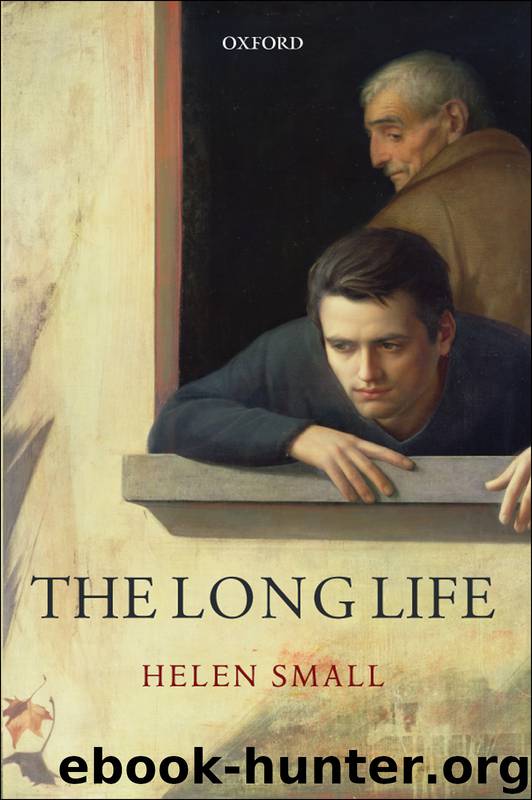The Long Life by Small Helen;

Author:Small, Helen;
Language: eng
Format: epub
Publisher: Oxford University Press, Incorporated
Published: 2010-03-11T16:00:00+00:00
6
The Bounded Life
Theodor Adorno’s late lectures on Metaphysics propose a ‘shocking thesis’: ‘metaphysics began with Aristotle’.1 A ‘doubly shocking’ thesis, Adorno tells his audience, because it gives credit where credit is not usually given, and declines to give it where most students of philosophy would understand that it belongs—with Plato (18). The Platonic theory of forms, as Adorno interprets it, missed the essential criterion for metaphysics—that is, it missed the essential criterion for how Adorno himself, somewhat unorthodoxly, wants to redefine ‘metaphysics’. Plato never fully accepted (Adorno claims) that the tension between the sphere of transcendence and the sphere of ‘direct experience’ is no mere adjunct of metaphysical inquiry but its defining subject matter (18). Aristotle, by contrast, understood that the proper goal of metaphysics is to present a non-transcendental essentialism: true metaphysics is an effort at once to define the limits of physical experience and to ‘rescue’ essence from the physical world. In his words, it is ‘the exertion of thought to save what at the same time it destroys’ (20).
I am not concerned, per se, with Adorno’s highly tendentious reading of Aristotle and Plato. He is right to point out that Aristotle’s Metaphysics attempts to avoid the transcendental metaphysics of Plato’s theory of forms, but surely wrong to suggest either that Aristotle was criticizing Plato in the way Adorno proposes, or that Aristotle was providing an entirely new definition of what constitutes metaphysics. Aristotle explains metaphysics in, roughly, two (closely associated) ways: as (1) ‘First Philosophy’: the first or ultimate explanation of things (their being), (2) the science of being, especially primary being (ousia). Aristotle claims no novelty for this representation of metaphysics, and he counts Plato prominently among his precursors (see Metaphysics 1. 3–10, 983b6–993a23; also 7. 1. 1028b19). In short, one has to read Adorno’s discussion of Plato and Aristotle as a flamboyantly non-conventional way into his own attempt to set metaphysics on a new path.
What interests me more is that, in the midst of Adorno’s setting out of the definitional ground for metaphysics, another subject repeatedly comes into view: a subject not obviously germane to the philosophical work at hand. Investigating the definitional limits of ‘direct experience’, Adorno keeps being drawn to consider the limit of human life—not just in the general sense of mortality, but in the more specific sense of old age as a temporal and biological limit to experience. An early hint of that association comes in Lecture 4. Though he is not particularly concerned with philosophy as intellectual history, when accounting for Plato’s contribution to the subject he takes a moment to refer his students to a line of historical argument that would allow Plato a firmer claim than he has allowed him to metaphysics proper. ‘[I]n the Anglo-Saxon countries’, he notes, ‘one not infrequently comes across the hypothesis that Plato as an old man was influenced retrospectively [rückläufig in the German (31)] by his pupil Aristotle; or that, as a result of his political disappointments in his attempts to set
Download
This site does not store any files on its server. We only index and link to content provided by other sites. Please contact the content providers to delete copyright contents if any and email us, we'll remove relevant links or contents immediately.
| Ancient & Classical | Arthurian Romance |
| Beat Generation | Feminist |
| Gothic & Romantic | LGBT |
| Medieval | Modern |
| Modernism | Postmodernism |
| Renaissance | Shakespeare |
| Surrealism | Victorian |
4 3 2 1: A Novel by Paul Auster(12037)
The handmaid's tale by Margaret Atwood(7573)
Giovanni's Room by James Baldwin(7000)
Asking the Right Questions: A Guide to Critical Thinking by M. Neil Browne & Stuart M. Keeley(5503)
Big Magic: Creative Living Beyond Fear by Elizabeth Gilbert(5486)
Ego Is the Enemy by Ryan Holiday(5124)
On Writing A Memoir of the Craft by Stephen King(4756)
The Body: A Guide for Occupants by Bill Bryson(4751)
Ken Follett - World without end by Ken Follett(4528)
Adulting by Kelly Williams Brown(4370)
Bluets by Maggie Nelson(4366)
Eat That Frog! by Brian Tracy(4290)
Guilty Pleasures by Laurell K Hamilton(4203)
The Poetry of Pablo Neruda by Pablo Neruda(3915)
White Noise - A Novel by Don DeLillo(3879)
Alive: The Story of the Andes Survivors by Piers Paul Read(3837)
Fingerprints of the Gods by Graham Hancock(3826)
The Book of Joy by Dalai Lama(3800)
The Bookshop by Penelope Fitzgerald(3673)
